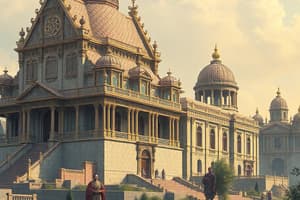Podcast
Questions and Answers
What was a notable event during the Middle Ages?
What was a notable event during the Middle Ages?
- The establishment of the Holy Roman Empire (correct)
- The discovery of electricity
- The invention of the printing press
- The rise of the Ottoman Empire
What was a significant event that occurred during the contemporary history period?
What was a significant event that occurred during the contemporary history period?
- The invention of the internal combustion engine
- The establishment of the United Nations
- The fall of the Berlin Wall (correct)
- The rise of the Ottoman Empire
What was a key event of the modern era?
What was a key event of the modern era?
- The Industrial Revolution (correct)
- The Renaissance in Italy
- The French Revolution
- The development of the telephone
What was the primary impact of the Crusades during the Middle Ages?
What was the primary impact of the Crusades during the Middle Ages?
What was a key factor that contributed to the decline of European hegemony in the modern era?
What was a key factor that contributed to the decline of European hegemony in the modern era?
How did the Middle Ages set the stage for the Scientific Revolution?
How did the Middle Ages set the stage for the Scientific Revolution?
Which ancient civilizations are mentioned in the text as laying the foundation for Western thought, philosophy, and democracy?
Which ancient civilizations are mentioned in the text as laying the foundation for Western thought, philosophy, and democracy?
In what year was ancient Rome established?
In what year was ancient Rome established?
What characterized the period known as the Middle Ages in Europe?
What characterized the period known as the Middle Ages in Europe?
Which ancient civilization influenced languages, religions, laws, and arts worldwide?
Which ancient civilization influenced languages, religions, laws, and arts worldwide?
What is one lasting influence of ancient Rome on modern society mentioned in the text?
What is one lasting influence of ancient Rome on modern society mentioned in the text?
Which ancient civilization introduced writing systems, agriculture, and complex social structures?
Which ancient civilization introduced writing systems, agriculture, and complex social structures?
Study Notes
General Knowledge: Exploring History
General knowledge encompasses a wide range of disciplines across various fields. In this article, we will delve into one of these disciplines, history, to explore important historical events and figures that shape our collective memory. From ancient civilizations to contemporary societies, history is the backbone of our global culture and identity.
Ancient History
Tracing its origins back to prehistoric periods, humanity has left behind numerous traces of past civilizations and societies. Some of the oldest known civilizations include Mesopotamia, Egypt, Indus Valley, Shang Dynasty, and Classical Greece, which laid the foundation for Western thought, philosophy, and democracy. These early societies introduced writing systems, agriculture, and complex social structures that paved the way for future developments.
Ancient Rome
Another significant player in shaping our world is ancient Rome. Established around the founding of the city in 753 BC, Rome quickly rose to prominence through military conquests and strategic marriages. Its powerful empire stretched across Europe, Africa, and Asia, influencing languages, religions, laws, and arts worldwide. Today, remnants of Roman architecture, literature, and legal principles continue to inspire modern society.
Middle Ages
Following the fall of Rome, Europe entered a period known as the Middle Ages, characterized by feudalism, Christianity, and the rise of powerful monarchies. Notable events during this era include the Crusades, establishment of the Holy Roman Empire, and the emergence of the Renaissance in Italy. The Middle Ages marked a crucial transition from medieval to modern Europe, setting the stage for the Scientific Revolution and subsequent leaps in technology and knowledge.
Modern History
The modern era saw unprecedented changes in politics, economics, and society. Key events and figures included the Age of Discovery, the Industrial Revolution, World Wars I and II, the Cold War, and the decline of European hegemony in favor of the United States and China. These transformations reshaped global relations and shaped the world we live in today.
Contemporary History
In recent decades, history has continued to unfold at a rapid pace. Significant events include the fall of the Berlin Wall, the rise of globalization, the internet age, and ongoing efforts to combat climate change and promote peace and equality among nations. Understanding these developments is crucial for navigating the challenges faced by current and future generations.
Conclusion
Exploring the vast tapestry of history offers valuable insights into our past, present, and potential future. By studying key events, figures, and societies, we gain a deeper appreciation for the complexities of human civilization and the interconnectedness of global events. As we continue to forge ahead, understanding our shared history remains vital for fostering tolerance, empathy, and unity across diverse communities.
Studying That Suits You
Use AI to generate personalized quizzes and flashcards to suit your learning preferences.
Description
Delve into the rich tapestry of history, from ancient civilizations to contemporary societies, to uncover the events and figures that have shaped our world. Explore the rise and fall of empires, key historical periods like the Middle Ages and Modern History, and the transformative events that continue to impact global relations today.




